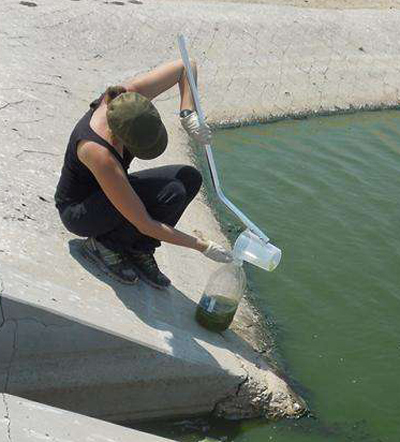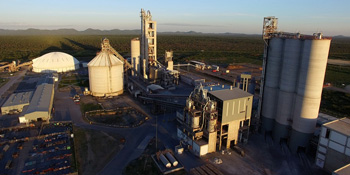
Outapi’s wastewater ponds produce fodder crops

By Freeman Ngulu.
20 December 2016 – Waste Water Engineering Research Group at the Universität of Darmstadt is researching ways on how to increase the capacity of Outapi’s 4-step pond system to treat waste water.
The Technical University of Darmstadt, under the joint project EpoNa, since September, has been upgrading waste-water ponds to generate irrigation water, while also researching waste-water stabilisation pond systems for deployment elsewhere in Africa.
In parallel with upgrading the ponds, the Hochschule Geisenheim University will also carry out tests to find the most suitable low-cost irrigation technique, as well as testing different crops and cultivation methods for suitability.
According to Jochen Sinn, the project engineer, if the concept proves effective, the entire plant can be converted, and the town as operator will be able to start extensive, all year round irrigation of fodder crops with waste-water sooner rather than later.
“There has been only little exploration of the concept of reuse, i.e. recycling water, especially in arid countries. But this is an approach with enormous potential, especially with regard to climate change. Water is a resource that is far too valuable to simply flush away,” Sinn said.
Sinn estimates that more than 5,000 inhabitants in the constantly growing town are already using the sewerage system. The produced waste-water passes through a succession of four ponds. The suspended solids sink to the bottom, where they are broken down by micro-organisms, and the sun’s ultraviolet light disinfects the water.
“The increasing town population is straining the sewerage system. When the ponds were constructed twelve years ago, Outapi had around 4,000 inhabitants, with only a small proportion having access to sewerage services. Increasing the carrying capacity of the ponds allows for the water to be reused for animal fodder production, a first for the Cuvelai-Etosha basin,” he said.
Sinn said that the system is so heavily overburdened and now silted up, that the original constructed evaporation pond keep overflowing.
“At the same time, the community is facing a problem of fodder shortage towards the end of the dry season lasting around nine months. The lack of water means that they can no longer cultivate enough fodder crops, so if the rain does not come, they have to slaughter livestock as a matter of necessity. The Town Council made use of its contact from the earlier Cuve-Waters waste-water project and approached the Institute IWAR to solve both problems,” he added.
Meanwhile, project manager, Prof. Dr. Susanne Lackner, head of the Waste-water Engineering Research Group at the TU’s Institute IWAR, said that the solution is finding a simple way to upgrade the existing ponds so that the waste-water can be used to irrigate fodder crops.
According to Prof. Lackner, different pre-treatment variants are investigated; firstly using an anaerobic biological process and then a mechanical micro-strainer.
Furthermore, she said guiding walls in the pond will ensure better flow control and an effluent filter will improve the water quality with regard to solids, algae and hygiene.
“These basically known methods are being combined for the first time and adapted for use under the constraints that exist in Africa. One of the two ‘treatment lines’ will initially be left in its present state, to act as a comparison for gauging the effect of the modifications,” Dr. Lackner added.











































